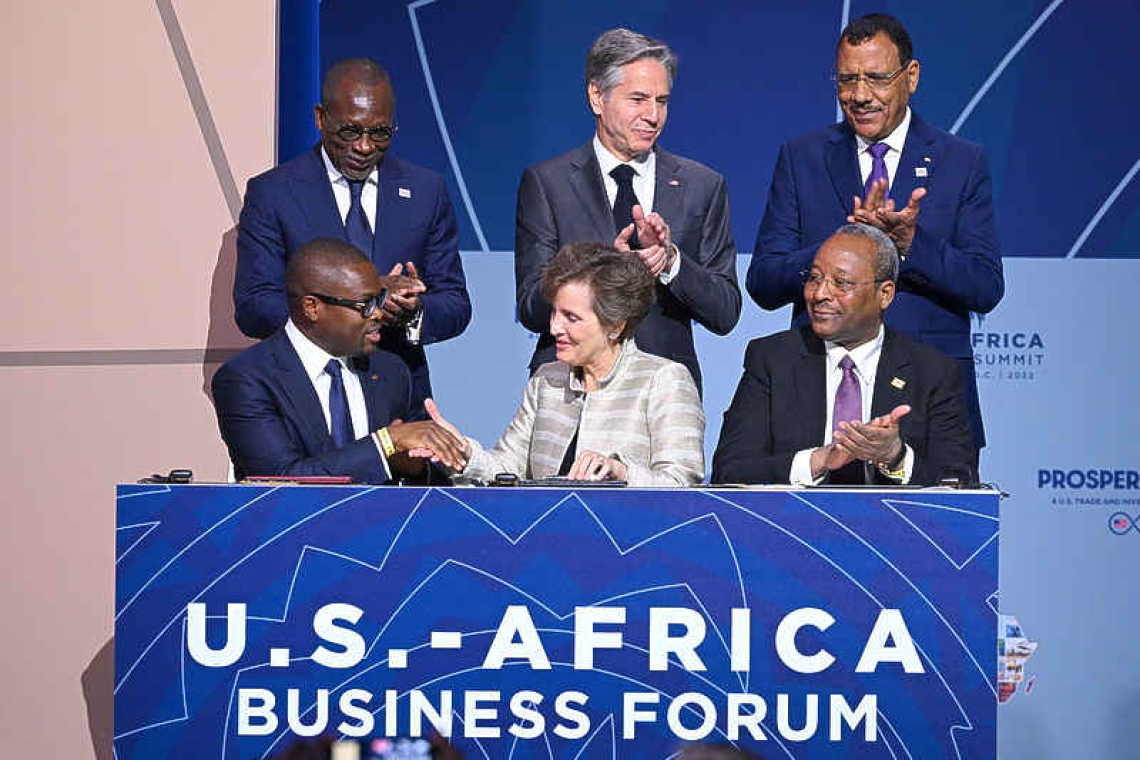WASHINGTON--President Joe Biden announced an agreement aimed at bolstering trade ties between the United States and Africa on Wednesday after years in which the continent took a back seat to other U.S. priorities as China made inroads with investments and trade.
"The United States is 'all in' on Africa's future," Biden told African leaders attending a three-day summit in Washington.
Biden's remarks, and the summit, aim to position the United States as a partner to African countries amid its competition with China, which has sought to expand its influence by funding infrastructure projects on the continent and elsewhere. Chinese trade with Africa is about four times that of the United States, and Beijing has become an important creditor by offering loans with less stringent conditions than Western lenders.
Biden said a new U.S. agreement with the African Continental Free Trade Area will give American companies access to 1.3 billion people and a market valued at $3.4 trillion. He listed companies that had made deals at the summit, including General Electric Co and Cisco Systems Inc.
"When Africa succeeds, the United States succeeds. Quite frankly, the whole world succeeds as well," the president said.
Delegations from 49 countries and the African Union, including 45 African national leaders, are attending the three-day summit, which began on Tuesday, and is the first of its kind since 2014. Washington has offered $55 billion in support for Africa under the Biden administration for food security, climate change, trade partnerships and other issues.
After his remarks, Biden viewed some of the World Cup semifinal match between Morocco and France with Morocco's prime minister, Aziz Akhannouch, and other leaders attending the summit, the White House said.
In the afternoon, Biden hosted leaders facing 2023 elections, including from Gabon and Liberia for a discussion on elections and democratic principles. Then Biden and his wife, Jill, were to host African leaders and their spouses at a White House dinner with Vice President Kamala Harris and her husband Doug Emhoff.
The summit is part of a renewed push to boost ties with a continent as China gains influence with trade, investment and lending drives. Beijing has held its own high-level meetings with African leaders every three years for more than two decades.
Some U.S. officials have been reluctant to frame the gathering as a battle for influence. Biden didn't mention China in his remarks, and Washington has toned down its criticism of Beijing's lending practices and infrastructure projects.
Biden is expected to announce his support for the African Union's joining the G20 group of the world's largest economies as a permanent member during Thursday's summit events.
U.S. Trade Representative Katherine Tai told African counterparts on Tuesday she wants to improve the continent's U.S. trade preferences programme to boost investment. "We are not looking for a relationship that is transactional, that's extractive, that is burdensome, or leaves various countries in a more fragile, poor state after a deal is done," State Department spokesman Ned Price told reporters on Monday.
On Wednesday, White House national security spokesman John Kirby highlighted the importance of U.S. investments in Africa and helping countries there play a more active role in the global economy. "It's a two-way discussion that we want to have with Africa about trade, investment and opportunities for economic growth," he told reporters.
At an opening trade forum on Wednesday, African leaders called for more investment. "Instead of exporting commodities, the U.S. should find an opportunity in investing," Kenyan President William Ruto said. "They have the machinery, they have the know-how, so that they can produce for the African continent in Africa."
Ruto cited projections that Africa's agribusiness sector will more than triple to $1 trillion by 2030 and said U.S. capital can help solve the continent's physical infrastructure deficit to unlock this growth.
According to a Eurasia Group analysis, in 2021 China-Africa trade, at $254 billion, greatly outstripped U.S.-Africa trade, which stood at $64.3 billion. Those figures are up from $12 billion and $21 billion, respectively, in 2002.
Beijing's lending to Africa has led to Western charges that China has mired African countries in debt. Beijing's ambassador to Washington rejected the idea ahead of the summit, citing a report that African countries owe three times more debt to Western institutions, while noting that Chinese-built hospitals, highways, airports and stadiums are "everywhere" in Africa.







